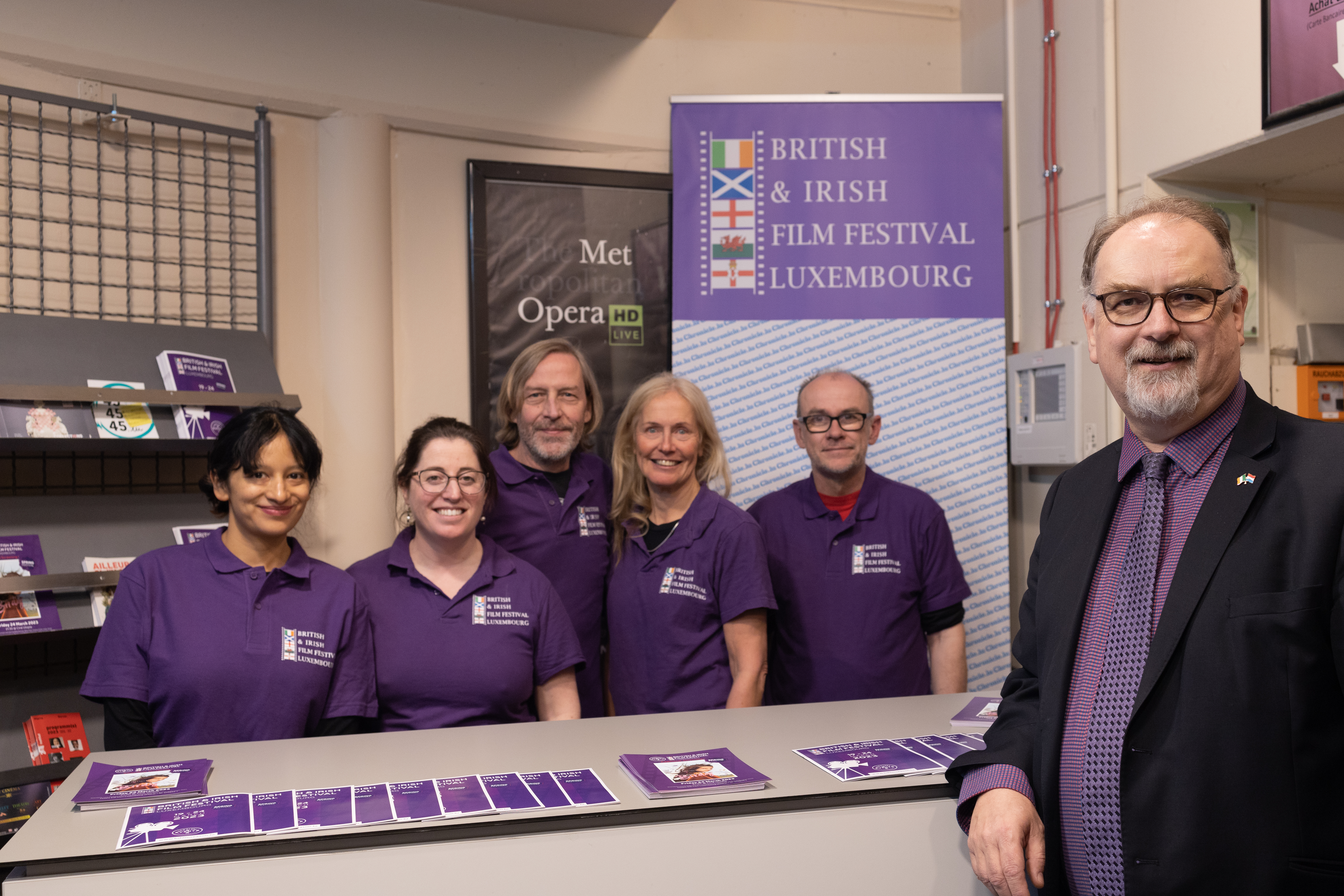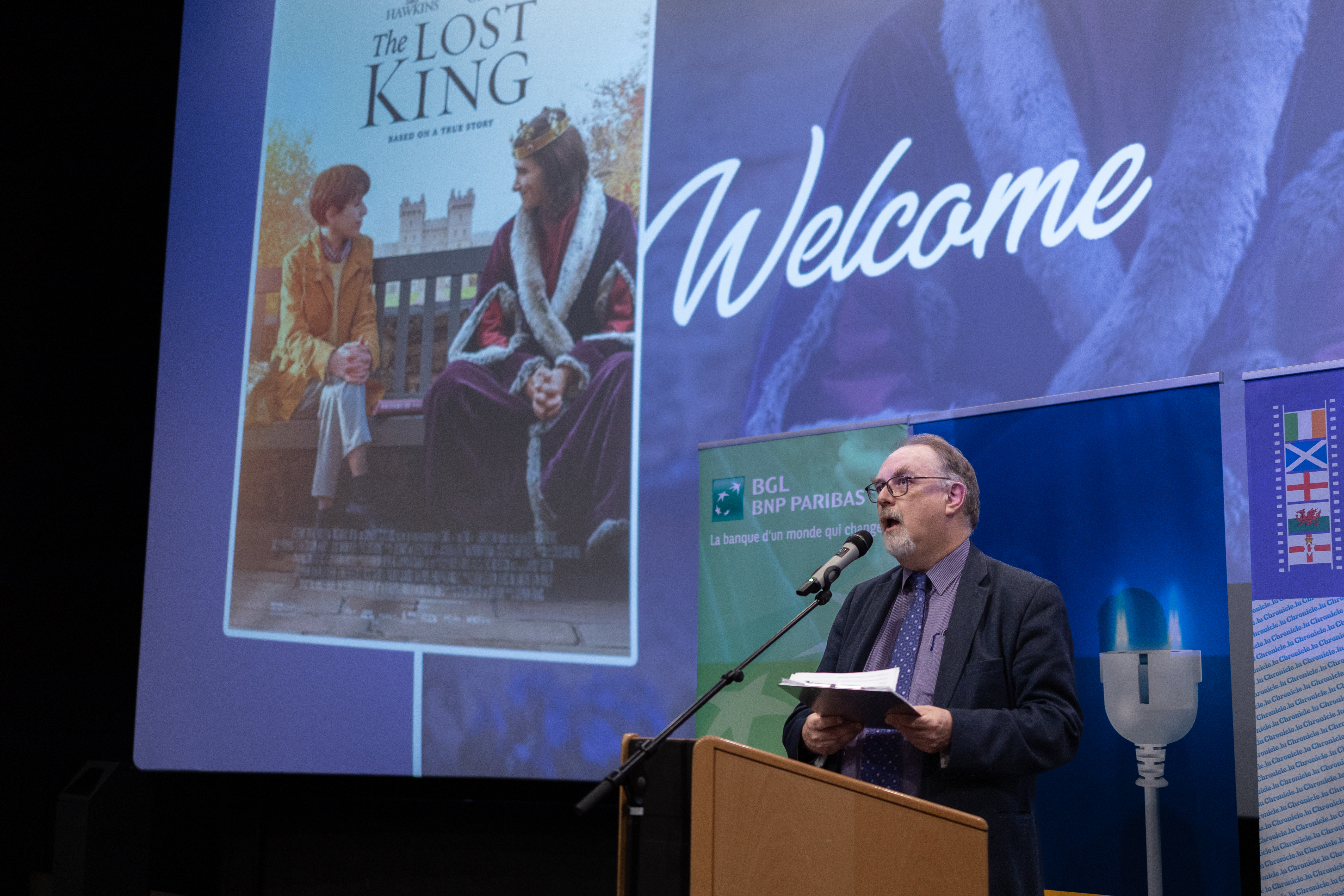06 mar. 2024British & Irish Film Festival

Luxembourg's small cinephile world is currently living to the rhythm of the fourteenth edition of the Luxembourg City Film Festival, and the 'spring edition' (there will be an autumn edition in September) of the fifteenth edition of the British & Irish Film Festival is also already around the corner. A festival that year after year has not only found its audience – beyond the expats – but has also (re)whetted the Grand Ducal public's appetite for that very special touch of British and Irish films. This spring edition program includes around 15 feature films and, on top, an evening dedicated to short films. Geoff Thompson, the festival director, presents this 15th anniversary edition of the festival.

This year, the British & Irish Film Festival Luxembourg celebrates its 15th anniversary. What led to the birth, in 2010, of what was then still the British & Irish Film Season?
Geoff Thompson: I have always had a love of cinema and, in discussion with the management of what was then Utopia SA, we looked at a new event, a new format, that would attract people to see specific screenings. I grew up watching Ealing comedies and Hammer horror films, as well as films made in Ireland. They are all about telling stories and providing a form of escapism, the “same but different” to reading and watching live theatre.
Why is it important to hold such an event in Luxembourg?
It is important for expatriates to have links with culture and heritage from back home, as well as to showcase British & Irish film on the big screen outside of Britain and Ireland.
As a specialist in the field, what do you think are the specific characteristics of British and Irish cinema?
What we have become accustomed to in commercial cinema over time is Hollywood blockbusters, etc. While they fill a primarily commercial need, there is so much more out there, particularly from Britain and Ireland. Part of it is storytelling, part of it is cinematography, and part of it is “not Hollywood” – not that I have anything against Hollywood; I certainly do not, but it's good to see different films, different genres, etc. –. And quite often nowadays, one sees similar storylines and similar characters, for example, in the Marvel universe.
And on a more personal level, what led you to develop a passion for cinema, and more specifically for British and Irish cinema?
As I said earlier, there are Ealing comedies and Hammer horror films, but to go more into detail, I remember going to see animated films in the cinema with my father, who would bring my brother and me out for weekend matinees. As I got older, I watched more films on television, and then, as a teenager, I started going to the cinema more. And when I was in university, I joined the Film Society where I quickly volunteered to collect the weekly films on old reels for screening, remembering to have a second bulb available in case the one in the projector broke down. And then selecting the films from a catalogue for screening over the following year...
What are the links between the Luxembourg film industry, on the one hand, and the British and Irish on the other?
There are many, particularly quite a number of co-productions over the years; there are arguably more Luxembourg-Irish co-productions as Film Fund Luxembourg and Screen Ireland operated a Co-Development Fund until October 2023. Luxembourg and Ireland also signed a co-production treaty in 2011. There are currently a number of Luxembourg co-productions in the works, including the Jim Sheridan-directed docudrama In Absentia with Vicky Krieps, and Stargazer with Poppy Delevingne, by Deal Productions.
The BIFF is keen to showcase all types of film genres, so how is the selection made each year?
I compare it to trying to make a multiple-dimensional jigsaw; on the one hand, I try to have an almost equal balance between Irish films and British films from all countries; we normally have more dramas than other genres, but some thrillers are well received. I also try to include Gaelic-language films, and documentaries normally score very highly with audiences. We also screened short films in September last year and will have another shorts evening in March.
From an annual event until 2022 - with a few St. Patrick's special seasons already - BIFF became a bi-annual event last year, with a spring and an autumn edition. What led to the double event?
I do not see it as a doubling of the event; the main festival was traditionally in September, and there were more calls for additional screening in the spring, with March being the obvious time to do so, around St Patrick's Day. While I attend the Galway Film Fleadh each July in Ireland, sometimes it is too early to arrange screenings for the coming September, and it is really too long to wait until the following September, so having two editions means that we can get films to our audience that much earlier.

In contrast, the Nordic Film Festival, BIFF's twin festival, which offered a selection of Danish, Swedish, Finnish, Norwegian, and Icelandic films, came to an end in 2017. Why did it stop after four editions?
Simply because of a lack of corporate sponsorship. The two main Nordic companies that supported it in the past are now either no longer in Luxembourg or focusing their marketing strategies elsewhere. The issue of attracting corporate sponsorship is one that is affecting the British & Irish Film Festival too, but we have been lucky to get funding from other sources. Other film festivals outside Luxembourg are also facing similar challenges from corporates defining CSR strategies that often exclude culture, or at least film and cinema.
The spring edition of BIFF 2024 will be held from March 13 to 23. What will the highlights be? Will there be any special events to mark these 15 years?
There are many highlights. First, on March 13, we will have a special screening of the 2010 Ireland-Luxembourg co-production The Runway with Luxembourgish producer Bernard Michaux in attendance for a post-screening Q&A. This event is to celebrate the 10th anniversary of Luxair's inaugural direct flight to Dublin, with airline tickets to be won at that event! We love having special guests over, and they will be for four of the films, starting with the Opening Screening of Verdigris on Monday 18 March which will be attended by both the lead actors, Geralding McAlinden and Maya O'Shea. And on Thursday 21 March our Shorts evening will see the awards for our Young Filmmaker Competition handed out – and excerpts from all 11 entries screened, with the Top 3 in their entirety –, as well as three other shorts, including the Luxembourg-France co-production that won an Oscar, Mr Hublot with co-director Laurent Witz present for a post-screening Q&A.
This edition will start only three days after the end of the Luxembourg City Film Festival. Isn't this calendar proximity a problem?
The core festival is from 18-23 March, with the “Luxair special celebration” the previous week – so not to coincide with St Patrick celebrations! And we also held two “pre-festival” screenings in collaboration with Ciné Utopia in February. I'm looking forward to attending a number of Luxembourg City Film Festival screenings and events, and our marketing arms are collaborating to support one another, not compete against each other.
Les plus populaires
- 26 juin. 2024
- 28 juin. 2024
- 05 juil. 2024
- 04 juil. 2024
ARTICLES
Videos
26 juil. 2024TAPAGE avec Ruth Lorang
Articles
22 juil. 2024Le fabuleux destin de Raphael Tanios
Videos
19 juil. 2024

